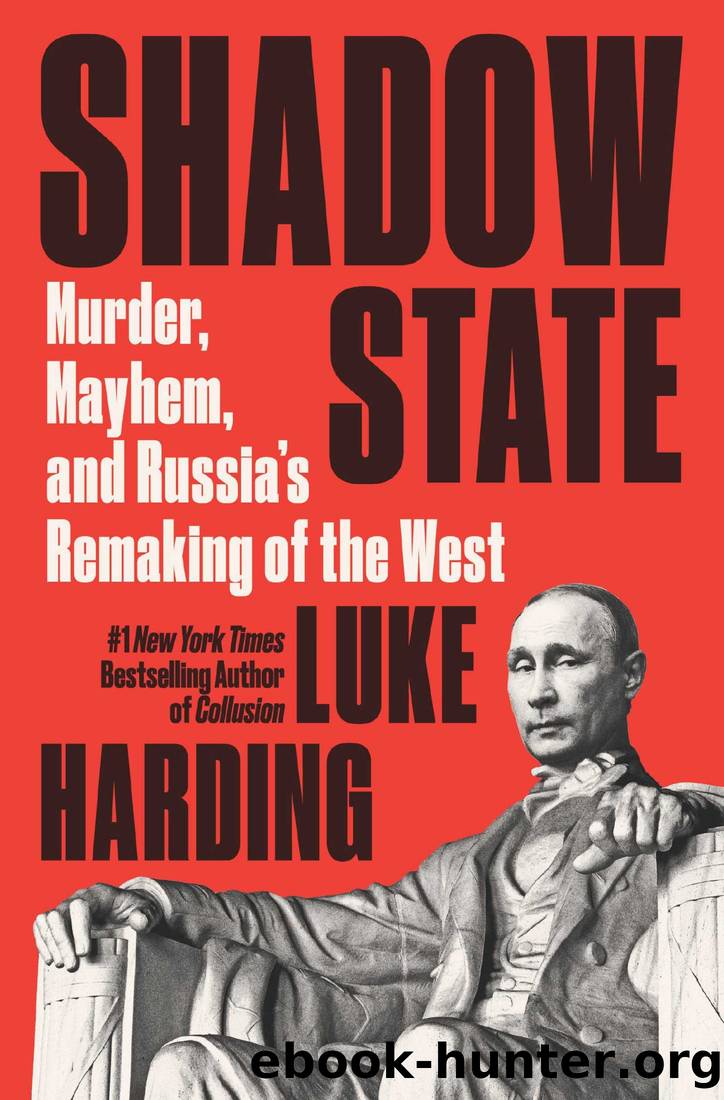Shadow State: Murder, Mayhem, and Russia's Remaking of the West by Luke Harding

Author:Luke Harding [Harding, Luke]
Language: eng
Format: epub
ISBN: 9780062966001
Amazon: 0062966006
Publisher: Harper
Published: 2020-06-28T23:00:00+00:00
Chapter 9
Moscow Gold
Amur River–London–Chicago
2015–2020
You Brits, what do you do? You take our black money and wash it. . . . You wring your hands when we poison our traitors and you say please, please, dear Russian friends, trade with us.
—JOHN LE CARRÉ, AGENT RUNNING IN THE FIELD
From his office window, the governor could peer out at a mighty foreign land. On his side a municipal square, a fountain, a statue of Lenin. Beyond was the Amur River. In winter when the river froze you could walk across. On the far bank was an industrial town of high-rises and factories. It belonged to Russia’s once enemy and now strategic partner, the People’s Republic of China.
The town of Blagoveshchensk is in Russia’s Far East. It is directly opposite Heihe, a Chinese metropolis. In the late 1960s Beijing and Moscow fought a brief border skirmish over one of the Amur’s islands. But relations between the two countries thawed, with agreements on international issues and enhanced military cooperation. Trade flourished. Russian tourists took river trips to Heihe. They came back with all sorts of items—fur coats, mobiles, even sex toys.
For Russia’s central government, six time zones and 4,847 miles away, the Far East was a headache. It was a remote region of taiga forest and mountains, bears and mammoth tusks, bigger than Europe. There was a geostrategic fear that China might overrun it, if not with tanks then with money and people. And there were the local Russian politicians—a succession of jumped-up mobsters. Their main interest was stealing. Theft was usual, of course. But blatant enrichment annoyed the population and fueled political discontent.
The solution, from Moscow’s point of view, was to find loyal officials with few autonomous tendencies. One such reliable person was Oleg Kozhemyako. In 2008 the Kremlin made Kozhemyako governor of Amur Oblast, based in Blagoveshchensk, the provincial capital. Kozhemyako fired the town’s mayor and fixed the power supply, no small thing in a place where winter temperatures fall to minus twenty-two degrees Fahrenheit.
In 2011 Kozhemyako got an adviser: Alexander Udod. The name sounds comic in Russian: it means hoopoe, a bird with a colorful crown. Udod was a tall young man with jet-black hair and a pleasant grin. His job title said bureaucrat; his real role was spy and undercover FSB officer. The Far East contained abundant natural resources: fish, timber, coal. And precious metals such as gold. Kozhemyako had his own interests, including a trawler fleet; he was an enthusiastic biker.
Udod’s shadow job, according to two sources, was to monitor Western businessmen seeking to invest. And to find out if they were sincere partners or perhaps foreign spies.
Udod worked with the local branch of the SVR, Russia’s foreign intelligence bureau, the sources said. He got to know leading entrepreneurs in the region. One was Siman Povarenkin, the owner of gold mines in Yakutia, farther north. For a time Povarenkin was chief executive of Vladivostok’s Far East shipping company. Udod’s connections—to spying, and to the world of mining and business—may have played a role in an intriguing story.
Download
This site does not store any files on its server. We only index and link to content provided by other sites. Please contact the content providers to delete copyright contents if any and email us, we'll remove relevant links or contents immediately.
| Arms Control | Diplomacy |
| Security | Trades & Tariffs |
| Treaties | African |
| Asian | Australian & Oceanian |
| Canadian | Caribbean & Latin American |
| European | Middle Eastern |
| Russian & Former Soviet Union |
The Secret History by Donna Tartt(19060)
The Social Justice Warrior Handbook by Lisa De Pasquale(12187)
Thirteen Reasons Why by Jay Asher(8895)
This Is How You Lose Her by Junot Diaz(6877)
Weapons of Math Destruction by Cathy O'Neil(6267)
Zero to One by Peter Thiel(5789)
Beartown by Fredrik Backman(5738)
The Myth of the Strong Leader by Archie Brown(5501)
The Fire Next Time by James Baldwin(5432)
How Democracies Die by Steven Levitsky & Daniel Ziblatt(5216)
Promise Me, Dad by Joe Biden(5146)
Stone's Rules by Roger Stone(5081)
A Higher Loyalty: Truth, Lies, and Leadership by James Comey(4955)
100 Deadly Skills by Clint Emerson(4921)
Rise and Kill First by Ronen Bergman(4780)
Secrecy World by Jake Bernstein(4743)
The David Icke Guide to the Global Conspiracy (and how to end it) by David Icke(4709)
The Farm by Tom Rob Smith(4502)
The Doomsday Machine by Daniel Ellsberg(4485)
